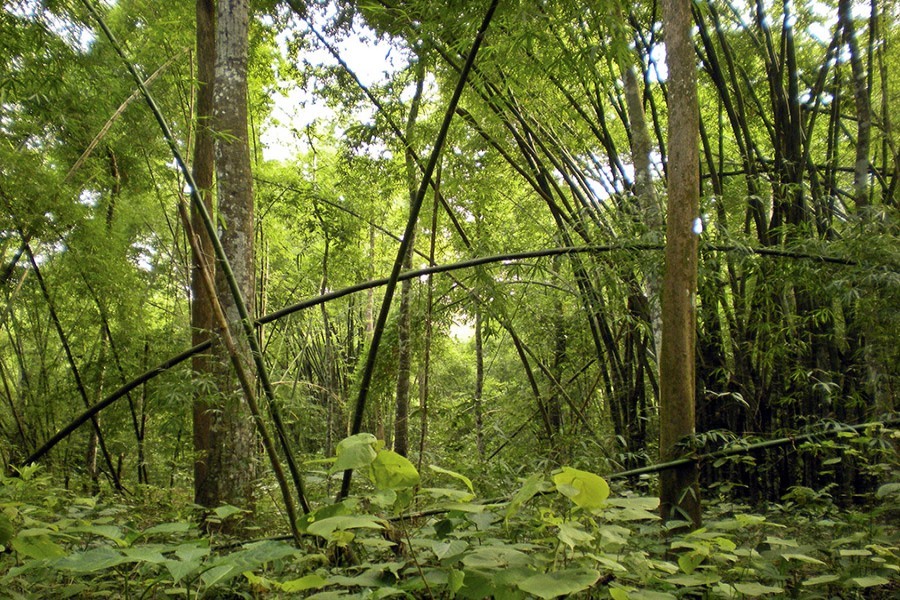Around two decades ago, ecologists presented a weird picture of the earth following several phases of extinctions of cataclysmic proportions. The planet they visualised would be devoid of humans. Amid an eerie silence,slimycreatures would be seen moving around, some wriggling through mud, others hanging from leafless low-height trees. Amid such a desolate scenario, the recent worries of Sir David Attenborough about the earth's dying biodiversity create another ambience ofgloom.His repeatedly pronounced warnings about the already fragile state of man have gone mostly unheard. But this time he seems to be highly upset about man's star-crossed destiny. In his new one-hour documentary 'Extinction: The Facts', the 94-year-old British natural historian, apparently in a last-ditch effort, calls upon man to save the planet. Earlier he said, "I just wish the world was twice as big and half of it was still unexplored." He called the nature-dominant world valuable, beautiful and wonderful, besides finding it to be an 'amazement and pleasure'. In the film broadcast on BBC, Attenborough exudeshigh optimism about man's capability to reverse thetrend of careening towards self-destruction, i.e. another mass extinction.
The selfless man, whose only passion has been saving nature and biodiversity, says, "I may not be here to see it, but if we make the right decisions at this critical moment, we can safeguard our planet's ecosystems, its extraordinary biodiversity and all its inhabitants." The one-hour film touches upon a broad range of climate-related issues. As could be expected, the focus of the committed naturalist had been shifted from one pressing issue to another. It was natural on his part. Two decades ago, greenhouse gas emission vis-à-vis ozone depletion had just begun unfolding before environmentalists. Due to the continued lack of consensus on reaching some critical agreements or pacts, the process of environmental degradation just deteriorated. It made ways for the broader issues of global climate change to overwhelm climate talks at different levels.
Against this backdrop, the issue that has emerged as the most dominant climate issue is global warming. It invariably relates to sea-level rise. Today, over a dozen countries including Bangladesh have been singled out as being vulnerable to this climate disaster.
David Attenborough has been laying emphasis on working out remedial measures on these issues which define the future of mankind. Unlike many other climatologists, Attenborough continued to return to nature and the state of its protection in order to build a habitable earth. The subject that kept the British naturalist preoccupied for the last few decades had been the human propensity to encroach on 'natural habitats'. Perhaps he was the first environmentalist to portray graphically mankind's tampering with the age-old laws of nature. By nature Sir Attenborough meant the planet's age-old rich biodiversity. He has never felt spent in portraying the consequences of biodiversity loss which are waiting to emerge before man. A most frightening aspect of the encroachment on nature and the living beings populating it is the series of reprisals. Thus David Attenborough draws an unambiguous link between biodiversity loss and pandemics like the raging coronavirus.
The extent to which the world's biodiversity is losing its richness has reached an alarming level. International experts have warned in a recent study that global animal, bird and fish populations have declined by more than two-thirds in less than 50 years. This frustrating situation has been prompted by mankind's rampant over-consumption. A section of ecologists feel tempted to add the incidents of the devastating wildfires that continue to destroy the world'svast tracts of forest resources to the orgy of the destruction of nature. Yet another group of environmental scientists continue to remind people of floods and excessive rains in the most unlikely places. Unabated formation of deadly hurricanes and typhoons in the oceans and seas, not excluding the tsunamis like the one in the Indian Ocean in 2004, comprises another apocalyptic scenario which keeps haunting mankind.
If the 21st century mankind considers the forecasts of men like Sir Attenborough with seriousness, keeping nature's protection in the midst of all imperatives, the planet earth can expect to avert the spectacle which is filled with just living beings --- not the animals which have emerged after million years' evolution process.
The news is ominous on the earth's climate front. Few countries are free of the onslaughts of the impacts of the changes in the planet's biosphere. Outwardly, the calamitous developments begin unfolding with human excesses like encroachments on nature, or, for that matter, unremitting release of greenhouse gases into the atmosphere. It doesn't take time for these human acts to snowball into disasters in the making. In the 21st century, humans find scores of massive calamities staring them in the face. Extinction of species occupies a dominant place among them. As has been detected by the International Union for Conservation of Nature (IUCN), of the 100,000 plants and animals it surveyed, a total of 32,000 are threatened with extinction. These include lots of common plants and insects.
The process of extinction of species in Bangladesh keeps gaining pace. Even in a span of just three decades, hundreds of plant genera and tiny animals like frogs, snails or oysters have disappeared from their age-old tracts and habitats. Countless species of animals which once roamed Bangladesh forests have long been considered extinct. The process began with the animals, to be followed by the very forests.People with environmental conscience, like Sir David Attenborough et al, might feel like dubbing the vanishing species as being caught in the universal tussle between nature's evolution and the annihilative force latent in the urge for mindless development.


